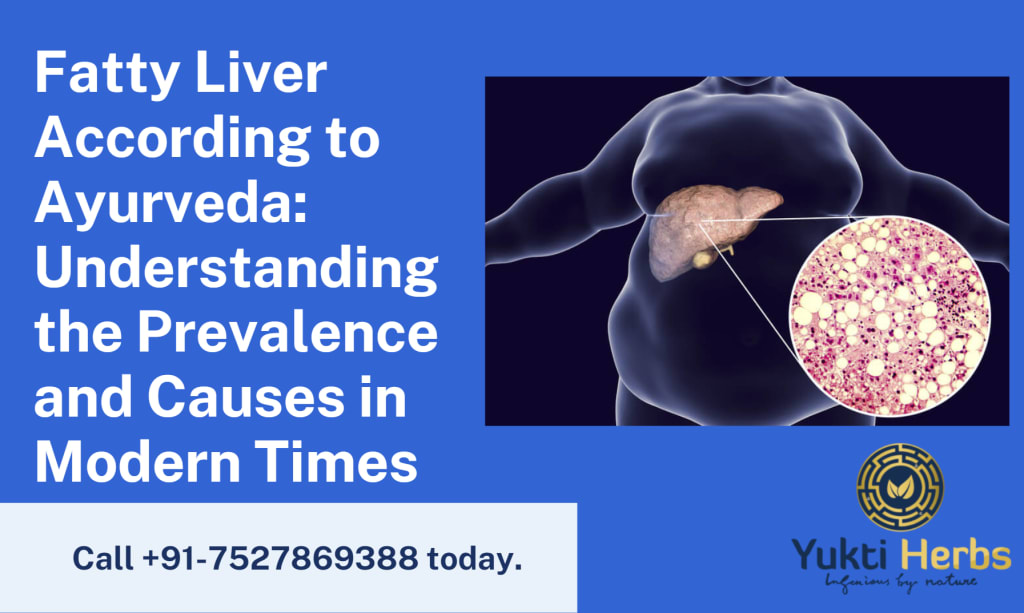Fatty Liver According to Ayurveda: Understanding the Prevalence and Causes in Modern Times
All About Fatty Liver and Ayurveda

Fatty liver, also known as hepatic steatosis, has become increasingly common in recent years, affecting millions of individuals worldwide. In Ayurveda, fatty liver is known as Yakrit Roga and is attributed to an imbalance in the body's doshas and poor lifestyle choices. This article aims to shed light on the rising prevalence of fatty liver and explore the underlying causes according to Ayurveda.
The Prevalence of Fatty Liver:
Fatty liver has reached alarming levels globally, affecting individuals of all ages and backgrounds. Sedentary lifestyles, unhealthy dietary patterns, and increasing rates of obesity and metabolic disorders have contributed to the rising prevalence of this condition. Modern-day stressors and a lack of proper self-care practices have further exacerbated the situation.
Ayurvedic Perspective on Fatty Liver:
According to Ayurveda, the root cause of fatty liver lies in an imbalance of the doshas, particularly in relation to the digestive fire (agni) and impaired metabolism. Excessive consumption of unhealthy, oily, and processed foods, along with a sedentary lifestyle, weakens the digestive fire and leads to the accumulation of ama (toxins) in the body. This ama, combined with imbalanced doshas, eventually affects the liver, leading to the development of fatty liver.
Causes of Fatty Liver in Modern Times:
- Poor Diet: The prevalence of processed and junk foods high in unhealthy fats, refined sugars, and additives has contributed significantly to the development of fatty liver. These foods overwhelm the liver's capacity to metabolize fats effectively, leading to their accumulation.
- Sedentary Lifestyle: Lack of physical activity and a sedentary lifestyle have become increasingly common in modern times. Physical inactivity leads to reduced fat burning and impairs overall metabolic function, contributing to the development of fatty liver.
- Obesity and Metabolic Disorders: The rise in obesity rates and metabolic disorders, such as insulin resistance and metabolic syndrome, has a strong association with fatty liver. These conditions disrupt normal metabolic processes, leading to fat accumulation in the liver.
- Stress and Poor Sleep: Chronic stress and inadequate sleep patterns have a detrimental effect on liver health. Stress hormones and disrupted sleep cycles can impair liver function and contribute to the development of fatty liver.
- Alcohol Consumption: Excessive alcohol consumption is a significant cause of alcoholic fatty liver disease. Alcohol is metabolized by the liver, and excessive intake can overwhelm its capacity, leading to fat accumulation.
Ayurvedic Approach to Managing Fatty Liver:
Ayurveda offers a holistic approach to managing fatty liver, focusing on restoring balance in the doshas, improving digestion, and eliminating toxins from the body. The following Ayurvedic principles can be beneficial:
- Diet and Nutrition: Following a balanced and nutritious diet is essential. Emphasize fresh, whole foods, including fruits, vegetables, whole grains, and lean proteins. Avoid oily, processed, and fried foods. Incorporate spices like turmeric, cumin, coriander, and ginger, which support liver health.
- Lifestyle Modifications: Engaging in regular physical activity and maintaining a healthy weight is crucial for managing fatty liver. Incorporate gentle exercises like yoga, walking, or swimming into your routine. Practice stress-management techniques, such as meditation or deep breathing, to reduce stress levels.
- Herbal Remedies: Ayurvedic herbs like Kutki, Punarnava, Guduchi, and Amla have hepatoprotective properties and support liver health. Consulting an Ayurvedic practitioner can help determine the appropriate herbal formulations and dosage for your specific condition.
- Detoxification: Panchakarma, the Ayurvedic detoxification and purification process, can be beneficial for eliminating toxins from the body. It involves therapies like Abhyanga (oil massage), Swedana (herbal steam), and Virechana (therapeutic purgation) to cleanse and rejuvenate the liver.
Conclusion:
The prevalence of fatty liver has reached alarming levels in modern times, primarily due to poor dietary choices, sedentary lifestyles, and various metabolic factors. Ayurveda offers a comprehensive approach to managing fatty liver, focusing on balancing the doshas, improving digestion, and eliminating toxins from the body. By adopting a holistic lifestyle, incorporating a healthy diet, engaging in regular exercise, and seeking guidance from Ayurvedic practitioners, individuals can effectively manage and prevent the progression of fatty liver, promoting optimal liver health and overall well-being.
About the Creator
Yukti Herbs - Ingenious by Nature
Yukti Herbs is a leading brand in the natural health and wellness industry, renowned for its exceptional line of herbal products. The company's philosophy is deeply rooted in the ancient Indian Ayurveda






Comments
There are no comments for this story
Be the first to respond and start the conversation.